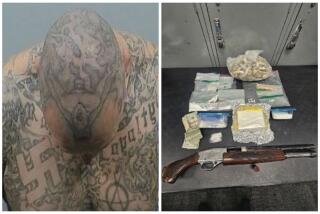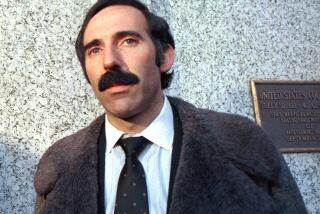26 Indicted in Sports Betting Probe : Crime: Bookmaking ring took in more than $1 billion a year, officials say. Prosecutors will seek deportation of suspects from Dominican Republic.
SAN FRANCISCO — After a five-year investigation, federal authorities announced Sunday that they have cracked what may be the biggest illegal sports betting ring in the United States with the indictment of 26 suspected organizers, mostly in Northern California and the Dominican Republic.
The U.S. attorney’s office said those indicted represent five major syndicates that ran high-tech betting operations on college and professional football, basketball, baseball and hockey games as well as horse racing and other sports. They claimed the syndicates used toll-free numbers and mainframe computers to take more than $1 billion a year from tens of thousands of bettors around the country.
Assistant U.S. Atty. William Schaefer said investigations continue into bookmaking operations in a dozen other cities that he declined to name, and that more indictments are possible.
Authorities said that a federal grand jury in the Northern District of California returned a 59-count indictment Tuesday that charged the suspects with international money laundering, racketeering, conspiracy and running illegal gambling businesses.
The indictments followed an investigation by the FBI, the U.S. attorney’s office and the Internal Revenue Service. Agents used telephone taps, confidential informants and IRS records to infiltrate and track the operation, Schaefer said.
Those indicted include former San Franciscan Ronald Sacco, who allegedly masterminded the bookmaking ring from his Dominican Republic villa. His operation is believed to have taken in a minimum of $1 billion in illegal bets each year.
Sacco remains in the Dominican Republic although U.S. Atty. Michael Yamaguchi said he will seek his deportation to the United States to stand trial.
The indictment claims that at least two of the gambling syndicates had moved their operations offshore to the Dominican Republic to escape “increasingly effective prosecution by state and local authorities.”
Although Dominican law allows local sports betting, it bars taking wagers from beyond its borders, according to the U.S. attorney’s office. Moving operations offshore and using toll-free telephone lines also put the syndicates out of law enforcement’s grasp, Schaefer said.
Illegal gambling is the largest source of revenues for organized crime in the United States, greater than illegal drugs or prostitution, according to studies by the Justice Department and Congress.
What impact the indictments will have on illegal sports betting around the country was impossible to determine, Schaefer said.
Also named in the indictment were pawnshop owner Darryl Kaplan, 53, of Atherton, and his father, Maximo Kaplan, 80, who reportedly used their Mission Jewelry and Loan Co. in San Francisco as a secret “bank” to process up to $15 million in gambling money.
Other syndicates involved were one in the Dominican Republic allegedly headed by Anthony Lobue, 58, of Santa Rosa and the late Robert Stapleton, who died last month, and another in San Francisco headed by Kevin O’Boyle, 48, of San Francisco.
Sacco, O’Boyle, Lobue and their attorneys could not be reached for comment.
Darryl Kaplan’s attorney, William Osterhoudt, said the money laundering allegations against his client are not well-founded.
He said the claims are ironic considering Kaplan and his father provide a public service. Employees at their pawnshop cash government assistance checks for poor people who do not have bank accounts and cannot afford the high premiums charged by other outfits, he said.
“He’s a fine man. I’m hopeful he’ll be exonerated,” Osterhoudt said.
Arraignments could begin this week although none of the major suspects have been arrested, Schaefer said. Those located outside the United States will have to return voluntarily or under deportation because the Dominican Republic does not extradite on gambling or money-laundering charges.
Eight of those named were listed in previous indictments and have been arrested or pleaded guilty.
More to Read
Sign up for Essential California
The most important California stories and recommendations in your inbox every morning.
You may occasionally receive promotional content from the Los Angeles Times.










